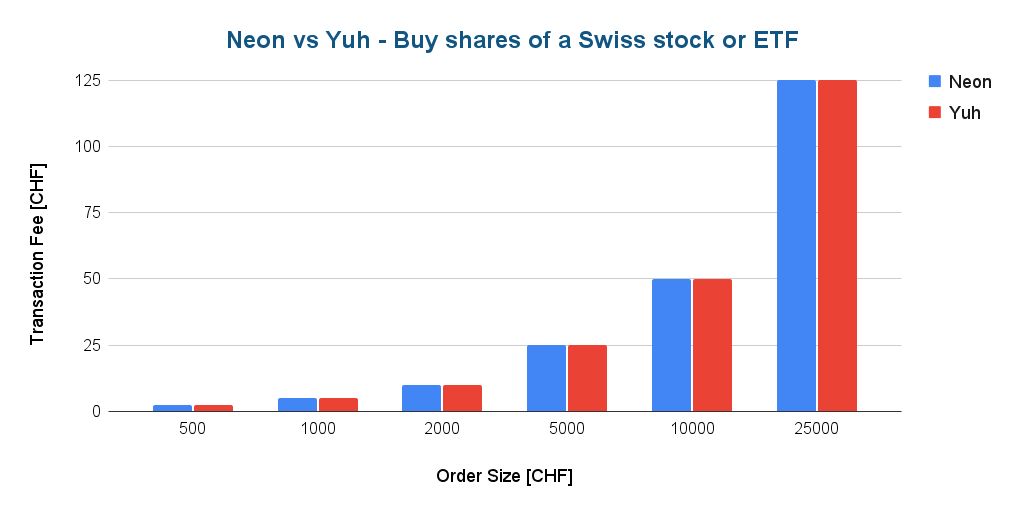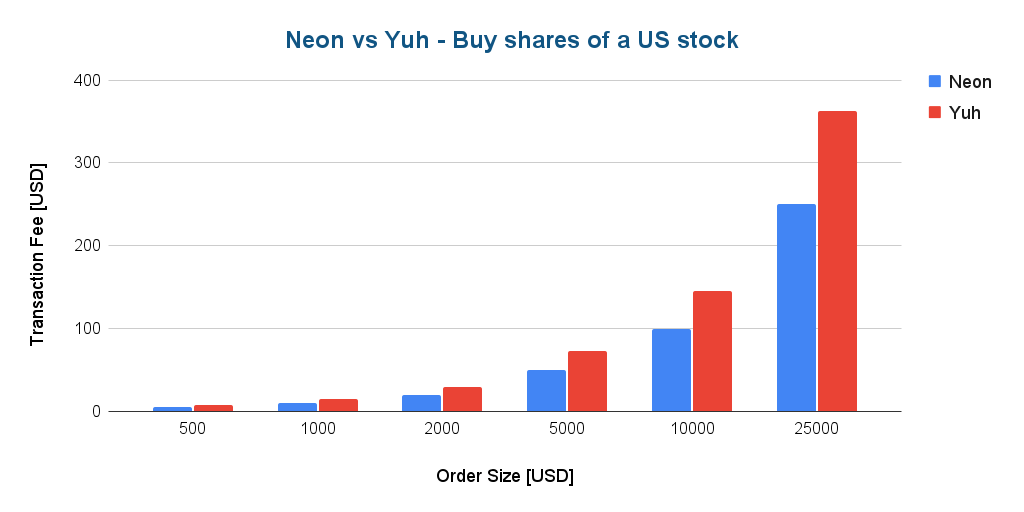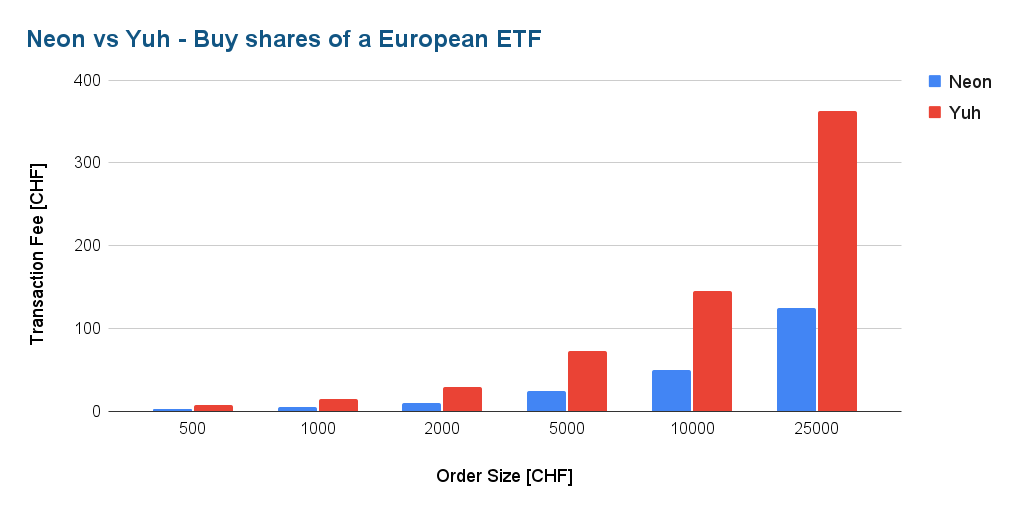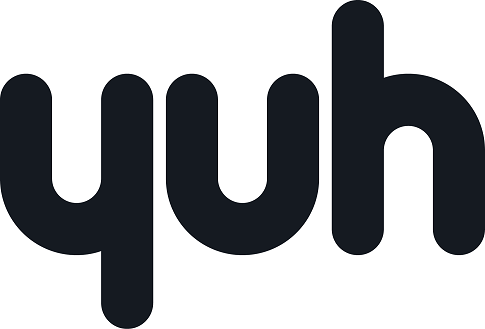Neon vs Yuh: Best digital bank in 2024?
| Updated: |(Disclosure: Some of the links below may be affiliate links)
Neon and Yuh are both popular Swiss digital banks. Yuh started with banking and trading features, while Neon started with only banking features. But in 2023, Neon introduced an investing feature to its app.
Therefore, both digital banks now have a similar set of features! So, it is time to compare Neon vs Yuh in detail for banking and investing.
In this article, I compare Neon vs Yuh, their fees, features, and advantages and disadvantages. By the end of the article, you will know which you should use.
|
5.0
|
4.0
|
Neon
Neon is among the first digital banks in Switzerland. They have started a new trend of digital mobile banks.
Neon itself is not a licensed bank. The money is deposited in the Hypothekarbank Lenzburg (HBL), a licensed bank.
Neon has grown quickly since its creation in 2019. In 2022 alone, they already reached 100’000 users. Such growth is an excellent result for a Swiss digital bank.
In 2023, Neon started Neon Invest, its new feature for investing in the stock market. This new feature makes it a fully-fledged app for saving, paying, and investing.
Yuh
Yuh is a more recent digital bank, started in 2021. It was born from a collaboration between PostFinance and Swissquote, each owning 50% of Yuh.
Yuh is not a licensed bank, but they use the Swissquote banking license to provide banking services.
Since its inception, Yuh has offered banking and investing features. It was always meant to be an app for everything banking: pay, save, and invest.
Yuh has one extra feature Neon does not have: A third pillar. In this article, I focus on banking and investing features. But if you want to know more, you can read my article about Yuh 3a.
Yuh has grown very quickly since its creation. Indeed, in 2023, they already reached 160’000 customers!
Banking features
Both banks are mobile apps, so you must download them on your phone. Both apps are available in all major app stores, including Huawei (without Google Play Store).
Yuh and Neon are available in English, French, German, and Italian.
Both apps have all the basic banking features:
- Receive money
- Transfer money to another bank account
- Transfer money to other users
- Pay your QR Bills
- Electronic Bills (e-bills)
Both apps also let you use Google Pay, Apple Pay, Samsung Pay, and TWINT. It is worth mentioning that Yuh has its own TWINT app, while Neon relies on the UBS TWINT app. So, you can use your account entirely from the app without using the phone.
Both apps offer Mastercard cards to pay in shops or online. 3-D Secure is used for fraud protection in both cases.
They also both offer sub-accounts for savings. They are called Spaces with Neon, while Yuh calls them Saving Projects.
Yuh offers a feature that Neon does not have: a multi-currency account. Currently, you can hold 13 currencies in your Yuh account. However, they are under the same IBAN, so they do not offer you local IBAN like Wise would do. But that can still be useful if you receive some foreign currencies.
As of October 2023, you get a 1.0% interest rate on Yuh and 0.90% on Neon Spaces (up to 25’000 CHF, 0.65% after that). So, currently, you get a higher interest rate on Yuh, especially for large balances.
Overall, Neon and Yuh have all the features you need for banking and have a very similar offer. Yuh has a slight advantage over Neon if you need to hold multiple currencies.
It is worth mentioning that Neon is only open to Swiss residents with permits B or C. At the same time, Yuh allows more permits, such as L. Yuh also allows opening accounts from neighboring countries like France, Italy, and Germany. This makes Yuh more accessible to foreigners.
Investing features
We can now compare the investing features of both apps. Since I do not recommend investing in crypto, I will only focus on investing in stocks and ETFs. But I will quickly mention that Yuh offers some cryptocurrency features while Neon does not.
Both apps let you invest directly from the main app. It is not a separate app.
Currently, both apps let you buy and sell through market orders only. While limit orders could be useful in some cases, it is not a significant issue since market orders work great for liquid stocks and ETFs. Also, both services have announced they are planning to support limit orders in the future.
Both apps are designed to be made easy to invest with. After testing both, they are both comparably easy to use.
Neon and Yuh do not offer access to the entire stock exchange to make it easier for their users. Instead, they offer a selection of stocks and ETFs.
- Neon offers about 200 stocks, while Yuh offers about 250 stocks, a slight advantage for Yuh.
- Neon has more ETFs (about 70) than Yuh (about 40), a slight advantage for Neon.
Neither offer access to US ETFs (the best ETFs for Swiss investors).
It is also important to mention that Neon only offers trading on BX Swiss, while Yuh provides trading on multiple stock exchanges. However, it should not matter much to most investors, except for a slight difference in spread (see the fees comparison).
We should also mention that Yuh offers access to themes such as Metaverse or Recycling on top of stocks and ETFs. However, these themes are implemented as structured products. These are complex products that most people should avoid.
One extra feature that Yuh offers is fractional trading. Fractional trading means you can put a fraction of a share instead of buying a full share. This can help when purchasing costly shares. This is an advantage for Yuh if you want to use fractional trading.
Neon has another advantage in that you can transfer shares out to another broker. For me, this is a sign of professionalism. With Yuh, it is not possible to transfer your shares to another broker.
Finally, Yuh also has one final feature Neon does not have: savings plans. These plans allow you to automate your investments. Neon does not have such a feature.
Overall, Neon and Yuh have the basic investing features necessary for passive investors.
However, Yuh has some extra features Neon does not have, like fractional trading, savings plans, and cryptocurrencies. If these features matter to you, you may want to lean towards Yuh.
Banking fees
Neither bank account has any running fee, so the base account and the basic features are free. This is one of the significant advantages of digital banks.
With Neon, you can withdraw for free twice a month at any ATM. With Yuh, you get one free withdrawal per week. After that, withdrawals cost 1.90 CHF with Yuh and 2.00 CHF with Neon. This gives Yuh a slight advantage, but it is not a significant difference since it is generally easy to avoid withdrawing money.
The main difference between Neon vs Yuh comes when we do some foreign currency transactions. The fees will differ if you pay abroad or online in a foreign currency.
- With Neon, you will get the Mastercard rate with no extra surcharge. This rate is about 0.40% worse than the interbank rate.
- With Yuh, you will pay a 0.95% currency exchange fee for any of the 13 default currencies and 1.50% for any other currency.
So, Neon is significantly cheaper than Yuh when using your card in foreign currency or abroad.
The situation is a little different when you do transfers in foreign currencies. Neon uses Wise to transfer, with an extra convenience fee of 0.40%. For Yuh, you will pay the currency conversion fee of 0.95% for the main currencies and 1.50% for the others. So, some currencies will be cheaper with Yuh and others with Neon. Overall, they both have average fees for foreign transfers.
Overall, both have pretty similar fees except for foreign currency operations. So, when considering everything, Neon is significantly cheaper than Yuh unless you never use operations in foreign currencies.
Investing fees
You want to minimize your investment fees to invest in the stock market. So, we will compare Neon and Yuh’s investing fees.
Neither of these apps has a custody fee, which is great because it means you will pay nothing to keep your shares with them.

With Yuh, you will pay 0.50% to buy a stock or an ETF, with a minimum of 1 CHF. With Neon, you will pay 0.50% for a Swiss stock or an ETF and 1.0% for a foreign stock.
So, for Swiss stocks and Swiss ETFs, both will have the same fee.

For foreign stocks and ETFs, we must consider foreign currency exchange fees. With Yuh, you will pay 0.95% for currency conversion. With Neon, you will pay no currency conversion fee. They achieve this by trading everything in CHF on the BX Swiss stock exchange. And the stock exchange itself will convert currencies at the interbank rate without markup.

You will pay 0.5% with Neon for a foreign ETF and 1.0% for a foreign stock. And you will pay 1.45% for a foreign ETF or stock with Yuh. This means Neon is significantly cheaper than Yuh for foreign operations!
I must mention that using BX Swiss has one slight disadvantage for Neon. On a small stock exchange, the spread of each operation will be slightly higher. This should not matter if you invest only once a month like me. But if you invest frequently, this could be an issue.
There is one extra difference for foreign dividends (not in CHF). With Yuh, you will receive the dividends directly into your account if they are in one of the 13 default currencies (which is very likely). However, Neon will convert them back to CHF with a 1.50% conversion fee.
With a portfolio with a standard dividend yield of about 2%, this extra fee is like a 0.03% custody fee (on foreign shares). This makes it more interesting to use accumulating ETFs with Neon.
With a very large portfolio (in the six figures), this can become a significant fee. So, you need to be careful and think about where you want to take your portfolio.
Overall, Neon will be cheaper than Yuh. This is especially true for operations in foreign currencies. It is also true for very small operations, but the differences are less important. But you may have to be careful about your foreign dividends if you have an extensive portfolio.
Safety
You must invest your money in a safe company. So, we must compare the safety of Neon vs Yuh.
Since neither company is a bank, they use another custody bank to store assets from their customers. Yuh uses Swissquote as their custody bank. Neon uses Hypothekarbank Lenzburg (HBL) for custody of assets.
These two banks have a good reputation for safety. Since they are Swiss banks, your assets with them will be insured for up to 100’000 CHF in case of bankruptcy.
The custodian bank also holds your shares in a different custodian account. In theory, everything should be fine in case of bankruptcy by the custodian bank.
If either Neon or Yuh goes bankrupt, your money will be safe with the custody bank. Regaining access to your money and assets will likely take time, but you should be fine.
So, when comparing the safety of Neon vs Yuh, both appear equally safe. Yuh has a slight advantage since it is backed by two large financial institutions, bringing more financial safety.
Reputation
We should also compare the reputation of Neon vs Yuh.
My primary source of data is Trustpilot for user reviews. We can look at the Trustpilot profile for Neon and the Trustpilot profile for Yuh.
Neon gets a 3.2 score out of 5 only. Interestingly, most of the reviews are either five stars or one star. The bad reviews are about technical issues of the app, mostly the app being down for maintenance (which happens regularly). Some people also complain about onboarding, which asks many questions (like all banks).
The positive reviews are mostly about people’s savings when using Neon abroad and the overall prices.
Yuh gets a 2.5 score out of 5 only. The complaints are about two different areas. First, people complain about technical issues blocking their money and poor execution of trades and transfers. Then, people complain about poor customer service, where it is impossible to get somebody to help. These reviews are interesting because I got similar comments on my blog about Yuh.
On the plus side, Yuh users like the simplicity of the platform and the low fees.
We must be careful and take these reviews with a grain of salt. First, there are not many reviews for these two companies. Then, Trustpilot is not always very representative of real users.
Nevertheless, these reviews still show some technical problems on both sides. It also shows some execution issues and possible money blocked for Yuh users. Since I have also received several reports about that, I tend to give some value to these reports.
Overall, it seems that Neon has a better reputation than Yuh. But Neon’s issues on salary day are hurting its reputation as well.
Neon vs Yuh Summary
We can summarize our Neon vs Yuh comparison with a short table:
|
5.0
|
4.0
|
|
No custody fees
|
No custody fees
|
|
|
|
|
- Swiss broker
- Very easy to use
- Excellent fees abroad
- Excellent fees for all operations
- Expensive for large operations
- No fractional trading
- Technical issues on salary day
- Swiss broker
- Very easy to use
- Fractional trading in stocks
- Good fees for most operations
- Hold multiple currencies in your account
- Foreign transactions could be cheaper
- Expensive for large operations
- Cannot transfer shares to another broker
We can draw a few conclusions for Neon vs Yuh:
- Neon is cheaper than Yuh when used abroad or in foreign currency.
- Neon is cheaper than Yuh when investing in foreign stocks and ETFs.
- Yuh allows you to hold multiple currencies in your account.
- Yuh allows fractional trading, while Neon does not.
- Neon has a slightly better reputation.
- Dividends in foreign currencies are not free with Neon.
- Yuh lets you automate your finances with savings plans.
Conclusion
All the services you need to pay, save and invest, in a neat package, with extremely good prices!
Use the poorswiss code to receive 10CHF!
- Pay abroad for free
- Invest with great fees
With their excellent handling of foreign currency conversion and all-around good fees, Neon is better than Yuh for banking and trading! If you trade in anything other than a Swiss stock or ETF, the difference in fees will be significant. And if you pay abroad or in foreign currencies, your fees will also be lower with Neon than with Yuh.
With the new invest feature, Neon is now a great mobile app to do it all: pay, save, and invest!
Neon and Yuh have all the necessary features to start trading in the stock market. They are both making it easy to start investing.
On the other hand, Yuh has some features that Neon does not have. Yuh allows fractional trading, savings plans, and basic cryptocurrency features and lets you hold multiple currencies in the app. This may be an advantage for Yuh if you strongly need these features.
One may argue that having a 3a benefits Yuh, but I disagree. People should not necessarily use one bank to do it all. No bank in Switzerland does everything perfectly. You should use the best service available (banking, investing, retirement) regardless of whether they are in a single bank or multiple banks.
If you want more information on these two digital bank accounts, you can read my reviews:
What about you? Which do you prefer, Neon or Yuh?
Download this e-book and optimize your finances and save money by using the best financial services available in Switzerland!
Download The FREE e-bookRecommended reading
- More articles about Best Brokers
- More articles about Investing
- Cornèrtrader Review 2024 – Cheapest Swiss broker
- Swissquote vs Interactive Brokers 2024
- Charles Schwab International Review 2024 – Pros & Cons



Hi Baptiste,
Getting back to the topic of interest:
I just switched my payment account, receiving salary and paying bills (‘Privatkonto’) to Yuh. Idea: Yuh offers their 1% interest on the Privatkonto. All other banks make you move your money to their savings acocunt.
Thanks again for your site, it’s such an invaluable resource of information and inspiration!
Cheers, Jens
Hi Mr ThePoorSwiss,
Yuh just changed the name of its ETF (today or this week). I think they are now much less misleading. For instance VUSD is now “Large Cap: USA (Vanguard S&P 500)” and VWRD is now “Large Cap: World (Vanguard FTSE All-World)”
It’s still not perfect as VWRD also contains some mid cap I think. But it’s now quite clear and not a differencing criterion with Neon I believe, especially because the ticker is more easily available.
Maybe you should update this article (and the Yuh review as well)?
Let me know what you think of the new names.
Hi Tanguy
That sounds great! Thanks for sharing! Do you see the new names in the app?
IN https://www.yuh.com/fr/app/invest/etfs/, I can still see the Global Blue Chips name.
I will double-check that with my contacts at Yuh and update my articles about YUh accordingly!
Yes, I can see the new names in the app, I guess they haven’t updated the website yet.
Awesome. As soon as I hear back from my sponsors, I will update my Yuh articles!
I got confirmation about the change from Yuh and the ETF list on the website should be updated in the coming weeks. Once it’s done, I will update the articles!
What about neon vs swissquote?
Their new banking package is very interesting, interest rate is 1%, cost is 6.9/month but it can be free if you don’t want the physical debit card and you can have multicurrency account where conversion is very similar to wise.
Moreover I understand you can use their card to borrow money with Lombard loan rates which can be very interesting for the people willing to take the risk and manage debt to improve return. Any opinion?
Hi Donato
I have reviewed the new banking service of Swissquote.
I have not yet done a full comparison of Neon vs Swissquote because Swissquote has many more features. So I am not sure this would make sense.
As a bank account, I feel like Neon is miles better. But Swissquote is likely better as a broker even though it may be more expensive in some cases.
Thanks for the informative article!
If I just want a banking account Yuh seems the better choice based on the interest rate, no?
-Yuh as banking account (1% interest)
-Revolut for paying or ordering abroad or in other currencies (very low conversion rates)
-Selma for investing (I’m getting too nervous handling investment myself)
and Pillar 3a
-Cashback Cards (AmEx) with 1% cashback for buying anything in CH (Coop, Migros etc) but for nothing else
Who needs the better fees of Neon if you have these other options?
Hi Peter,
If you base only on the interest rate, 0.9% < 1.0%, yes. But is that really enough of a parameter? Also, there are some accounts with significantly higher interest rates in switzerland, so why settle for 1% if you are chasing interest rate? Keep in mind that Revolut introduce a new exchange rate recently, that makes it about 0.4% worse than interbank exchange rate. And revolut is only good below the free limit, after that Neon is cheaper. You could replace Yuh and Revolut by Neon and have a simpler time. But other than that, this set of chosen tools makes sense!
But are there really good options with higher interest rates for amounts up to 50k CHF, which do not have 100 strings attached?
E.g. at Raiffeisen you get a bit more (1.2) with a members savings account, but you have to buy ‘Anteilsscheine’ first from them etc.
Also, the CLER advertisements are deceiving imo, since the 1.8% are only for the first year (afterwards 0.8) and if you don’t take out more than 20k. And since its a pure savings account you don’t get a Master/Visa card and transferring money also includes a fee.
Most banking options which are not pure saving orientet have worse conditions of what i’ve seen.
My take home would be: If you don’t spend a lot of money in other currencies, Yuh+Revolut is the winner, while if you want it either easier (with slightly lower interest) or spend a lot of money in other currencies, go with Neon.
I agree that anything with “first-year” rate hikes should be avoided, it’s pure marketing and stupid in the long term.
What about WillBe or even Alpian?
Revolut+Yuh is not bad indeed, but I still fail to see how it’s better than simply Neon. Revolut has about 0.4% spread surcharge, like Neon and you can use a single service instead of two. The only advantage of Yuh/Revolut would be if you need to do transfers in foreign currencies or receive money in foreign currencies. For me, simplicity far outweigh 0.1% in interest rate (if it was 0.5%, it would be a different story maybe).
I was trying to compare Neon and Revolut on a real-life example with 100 CHF to USD. When I check the rates of Neon here:
https://wise.com/us/compare/neon-chf-to-usd
I get 113.28 USD.
If I do the same thing in Revolut (https://www.revolut.com/en-US/currency-converter/convert-chf-to-usd-exchange-rate/?amount=1), I get 114.83 USD which seems to beat it by 1.4%? The Revolut part I can confirm in the App (that it is real), the Neon I can’t since I currently don’t have an account there.
Regarding interest: WillBe would indeed be interesting, a bit of a bummer is that it doesnt seem to be intended for daily use/pay. I like if this is the case since the investing amount I would anyway invest somewhere else than on a bank account (with hopefully more return).
Alpian is a great option that combines this, but only useful for depositing >50k since below you get lower interest (1%) and very high fees. And at this scale I would again (personally) not keep this in raw cash on the account.
Interesting. Revolut is not transparent anymore with its rates because it switched from interbank to “Revolut Exchange Rate”. It was reported to be about 0.40% worse, so it should be on the same order of magnitude as Wise.
Now, this comparator is only for wire transfers in foreign currencies, not for foreign abroad. Indeed, the fees are different for Neon for the card and for transfers.
Yes, Alpian is only good if you have a lot of cash and most people will not (and probably should not) have that kind of cash.
I would not have any hopes in better interest rates. In fact, the Leitzinsen of the SNB are expected to come down again this year. Soon after, banks will likely reduce their interest rates on bank accounts again. If you are lucky, they will keep them as is.
There is no way to know what the market and SNB will do, but it’s true that if rates go back down, so will interest rates, slowly.
I am comparing the 2 banks as options for my daughters first ‘grown up’ account. I am concentrating on easy of use. Neon seem to edge this one.
Other than that there are 6 differentiators
1. 3rd pillar – included in Yuh
2. Twint – included in Yuh
3. ebill – both include support, I am not clear on which is better integrated.
4. Tax – neon has eTax ( a huge win for anyone filling out a tax form for the first time). It is coming for Yuh, but when?
5. travel – we are a dual citizenship family and spend a fair amount of time outside of the country. Neon wins on card charges hands down, but the multi currency accounts of Yuh are attractive. No clear winner.
So it seem the optimal is neon, plus Franky, plus Wise, plus the UBS twint app – hmm 3 accounts. But maybe the best for my daughter growth into financial independence. Add Selma to the mix and this is a good basis.
It’s just a pain to have 5 logins and 5 sets of T&A’s
With Yuh, over time it seems this could all be done in one place (maybe not Selma).
I also understand there are no ‘power of attorney’ options – which I would have at Migros bank. This has proved very useful in the past when something goes wrong and I am asked to deal with it.
So have I missed anything? Marcus do you have any further pointers. (Note: Currently all family accounts are at Migrosbank, a good cheep bank as you know. However, the ebanking has been a mess for years and the latest upgrade did not help much at all. It is clear that ebanking is undervalued by Migrosbank and so I see it as a bank for old people, which I am ;-) . I will stay for my mortgage but I am thinking of moving daily business and cards to Neon for myself.
cheers,
Andrew
I think trying to have all accounts in the same place is simply a fallacy. And it can be an expensive one. There is no single place to has the best accounts for everything. I actually wish that all banking apps would try to do everything. Investing and banking is already more than enough, but adding a 3a to the mix does not make sense in my opinion.
I would much rather use 5 different accounts that are really good than 1 with 5 features that are all sub-par.
I am also thinking of moving our main account to Neon. The ebanking is bad at Migros and it’s getting worse with the new update. I am just waiting to get joint account at Neon.
Concerning ebill, the core functionality is more or less identical with all Banks.
I have accounts with yuh (main account), neon and Migros and have linked all 3 of them to my ebill account. Yuh displays an info banner on the welcome screen when a new ebill bill is received. From memory the same goes when you miss a payment deadline => they display a reminder message. I don’t think neon does this.
Now whether this can be considered a differentiator or not…. :-)
The base system is indeed the same. However, some banks integrated ebills fully while others (Neon for instance) only redirect to the web portal for ebills. Personally, I don’t think it matters either way, but some people prefer the full integration.